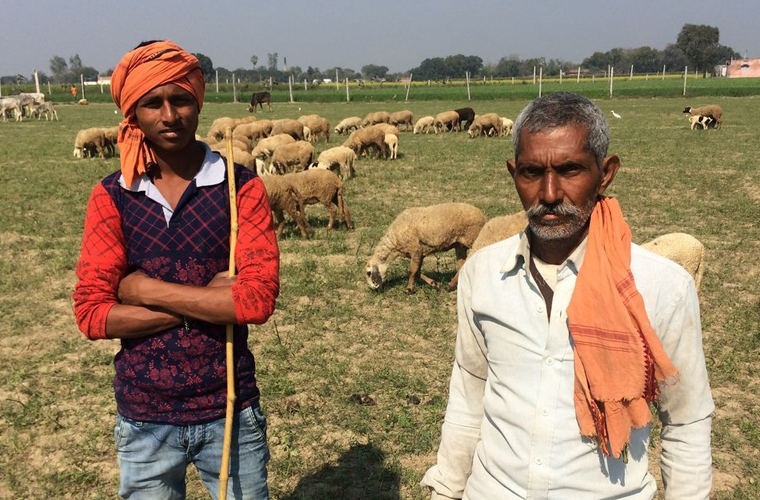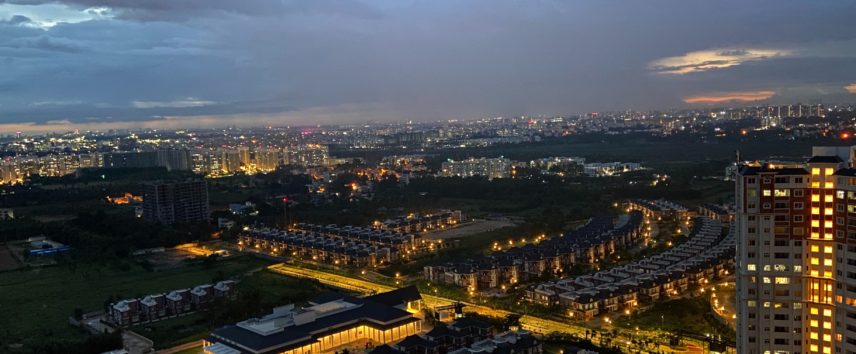Trending Now
- “I will soon make an announcement regarding a statewide tour across Tamil Nadu.” – O. Panneerselvam.
- Vatsala, Asia’s oldest elephant, has passed away at Panna Tiger Reserve; social activists mourn the death of this elephant, which lived for over 100 years.
- “The U.S. Govt earned ₹8 lakh crore this year through increased tariffs on foreign goods.” – U.S President Donald Trump.
- World No.1 Aryna Sabalenka has advanced to the semifinals in the Women’s Singles category at Wimbledon Tennis.
Columns
Moving up: How caste shapes the choice of work in one Uttar Pradesh village
![]() February 19, 2017
February 19, 2017
Many residents stick to their inherited caste occupations or allied ones – unless there is a government job on offer.
Supriya Sharma
Sunil Pal sat on the edge of a fallow field in Baksha village in eastern Uttar Pradesh, guarding his flock of sheep. All of 17, the young shepherd had a firm view on his place in the world.
“I am a Rai Chanel Pal,” he said. “It’s one of the seven sub-castes of Pals who are part of the Gaderias.”
The Gaderias traditionally rear sheep. Elaborating on their voting preferences, Pal said, “We vote for the Samajwadi Party because we are Backwards. If we leave the SP, we will go for the BJP [Bharatiya Janata Party], not the BSP [Bahujan Samaj Party], kyunki wo neech jaati hoti hai. Because they are lower castes.”
Caste pride apart, the traditional occupation of the Pals is on the decline, admitted Pal, because of the shrinking demand for wool. “It’s at zero point,” he said. Thankfully, for his family, there is still demand for another sheep byproduct: manure.
For nine months in the year, barring the winter, Pal and his father herd their flock of sheep into the fields of farmers who want to refertilise their land. Sheep manure is rich, Pal claimed, because it comes mixed with “hair and sweat”. Besides, it is economical for farmers: a flock of 40 sheep can be hired for the cost of five cows. Left to graze round the clock, the flock takes anywhere between 10-20 days to saturate one bigha of land. For one day, the farmer must pay Rs 200 and provide “do logon ki khuraaki” (meals for two).
“It’s hard work. You have to keep watch day and night,” said Pal, who takes turns with his father to do so. After sunset, the lambs are tethered to a rope strung between poles. This usually keeps the flock in place, but in case the animals are unruly, they are paired together, one leg tied to the leg of another.
While there is enough demand for sheep manure to support his family, it is not enough for all the Pal families. Of the 30 Pal families that live in Churawanpur, Sunil Pal’s village, which borders Baksha, only two follow the inherited caste occupation. Others have diversified into rearing cows and buffaloes. Many have migrated to the cities. Sunil Pal’s uncle, for instance, has moved to Mumbai, where he has opened a tabela or dairy farm in Dahanu on the outskirts.
Those unable to branch out into an allied occupation, prefer opening businesses and working in factories, said Pal. “Itta gaada kaam nahi karenge.” We won’t work on construction sites.
More than progressive laws and ideas, it is the collapse of the agrarian economy that is weakening the hold of caste in Baksha, which lies in Jaunpur district. Land-based work can no longer support the traditional social order where caste groups were bound in interdependent, yet hierarchical relationships. The land-owning castes exerted control through the jajmani system in which the lower castes offered them services in return for foodgrain and fodder.
Rajkumar Sharma, a middle-aged man who belongs to the Nai caste of traditional barbers, remembers that his father serviced 30 families and was paid five kilos in six months by every jajman or patron. His services extended beyond those of a barber – “dhaadhi cheelat, baal banawat, nyota bhi baantat.” He would shave beards, cut hair, but also run errands.
Unlike people from other castes who have had to abandon their traditional occupations because they were ill-suited to the modern economy, the Nais of Baksha have been able to integrate their old caste skills in a market-based system. Sharma and his brothers now run hair salons in the bazaar and have customers who pay and not patrons. “The new system is better,” he said. “Earlier people behaved arrogantly.”
But the jajmani system hasn’t entirely died out – Sharma is still paid in kind by two Brahmin families. He is also connected to other families that require his presence in ceremonial rituals during weddings and funerals. “Raja aur praja mein nau ka pad hota hai,” he said. The barber has an assigned place in a system where some are rulers and others are the ruled.
Even as caste weakens, the notion that work reflects one’s status in the world remains. Shanti Gupta of the Teli caste repeated Sunil Pal’s words: “Itta gaada ka kaam nahi karenge.” We won’t work on construction sites.
The Telis are traditional oil-pressers. Officially classified as Other Backward Classes, they see themselves as Vaishyas or Banias, much like Yadavs see themselves as Kshatriyas.
Gupta remembers seeing her elders harnessing bullocks to the press to extract oil from mustard seeds. “They tied a cloth around the eyes of the animals so that they would not feel dizzy,” she said. As mechanised processes made the traditional occupation redundant, Gupta’s family migrated to Mumbai, where they became vegetable vendors and grocery sellers. After marriage, her husband joined his father-in-law’s business in the city.
Sounding mildly defensive, Gupta said that while people from the Maurya caste sell vegetables in the village, in the city, everyone does. “Karenge nahi chota mota kaam to apna parivaar kaise chalayenge.” Without picking up small-time work, how will we provide for our families.
While the community is open to doing factory jobs, they are mainly inclined towards opening businesses, she explained. “Apna dhanda kuch rakh ke bech lenge.” (We prefer selling something.) In the village, for instance, Gupta’s brother-in-law has opened a tea shop on the highway passing through Baksha.
It was on a trip to Mumbai in 2014 that Gupta first heard about Narendra Modi, the leader who used to sell tea. “Humare bhai sahab kahe apne sab biradar hai,” she recalled. My brother said he is from our community.
In the past, the family had alternated between supporting the Samajwadi Party and the Bahujan Samaj Party. But in 2014, they voted for the BJP.
Two and a half years later, Gupta is disappointed. “Modi hasn’t done anything for us,” she said.
Yet she will still vote for him: “Bhai, humari jaat ka hai. He is from our caste. We will vote for him, regardless of whether he wins or loses, regardless of what he does.”
Even Sunil Pal, the young shepherd boy, emphasises the primacy of caste. About the voting behaviour of Pals, he said: “SaPa mein dete hai chahe maare ya gaali dein, kyunki Aheer-Gaderia bhai bhai hote hai.” We vote for the Samajwadi Party leaders, regardless of whether they abuse us, because Aheers and Gaderias are brothers.
Said Shalik Ram Yadav, a 65-year-old farmer who stood listening on the side: “Upar waale ka banda ek hai. All are equal in the eyes of God. He has neither made Aheers, nor Thakurs, nor Pandits, nor Kewats, nor Chamars, nor Dhobis.”
What sounded like a pean to a casteless society, turned out to a prelude for the immutability of caste.
“As the universe was created, the progeny of the sages spread,” Yadav said. “Jo rishi jaisa tha, unke vansaj ko waisa karam diya gaya, kaam kar raha hai wo apna.” Depending on the attributes of the sage, his progeny were assigned work, which they are doing till this day.
Given the endurance of caste, the best bet for political parties that want to woo caste groups that do not readily identify with them lies in picking leaders from the community and giving them prominence. That’s the strategy that BJP has adopted to win over Mauryas, Pals, Telis, Nais, and other non-Yadav middle castes which are individually small in numbers, but collectively form a large group.
The three Teli families of Baksha look upon Modi as their leader. Many Mauryas in the village have taken note of the fact that the BJP has appointed a member of their caste – Keshav Prasad Maurya – as the state president. And while the Pals have a natural affinity to the Samajwadi Party, the BJP is hoping they will influenced by the selection of a Pal leader as one of the two mahamantris of Malhani constituency, of which Baksha is a part.
In this mix, the Nais of the village showed no clear political moorings.
The women of one Nai household expressed support for the Bahujan Samaj Party and its leader Mayawati. “There was no gundagardi [criminal activity] during her rule,” said Lalati Sharma, whose sons run a barber shop in the bazaar. “In their rule [Samajwadi Party], only their own people have prospered.”
Sharma identified Mayawati’s biggest achievement as the creation of government jobs. “She created so many new posts of safai karamcharis,” she said, referring to the recruitment of more than a lakh community sweepers, one for every revenue village.
By the standards of the village, the job came with a hefty salary. Mohit Kumar, a 29-year-old Dalit resident, said he was appointed in 2009 at a starting salary of Rs 7,500 per month. The latest pay revision has taken this to Rs 20,200.
If anything has the power to shake people out of their caste-based notions of work, it is the security of a government job.
When the posts of safai karamchari were advertised, Sharma remembers asking her son to apply. He shot back: “You want me to go from shaving beards to cleaning drains? Ginn aawat hai. I am disgusted.” But the daughter-in-law of Sharma’s sister-in-law applied and got selected. “She hasn’t been asked to clean drains even once,” Sharma said. “She has been posted in a school.”
In the block office, Rajendra Yadav, the assistant block officer, quipped: “How will anyone clean drains when there are no drains in the village?” The safai karmacharis have been assigned other administrative work, he said, including the task of entering data in computers. “Some of them are well qualified.”
As the election approaches, the safai karamcharis of Baksha block have been given a new task. “They have been trained to do what you do,” said Yadav. “They have been taught videography and they will work with election observers.”
As Uttar Pradesh is gripped by election fever, Scroll.in’s “A Village Votes” series will bring readers glimpses of how the residents of Baksha, a village of 2,500 people in the eastern part of the state, are making up their minds about whom to support.
Disclaimer: The views expressed above are the author’s own.






















